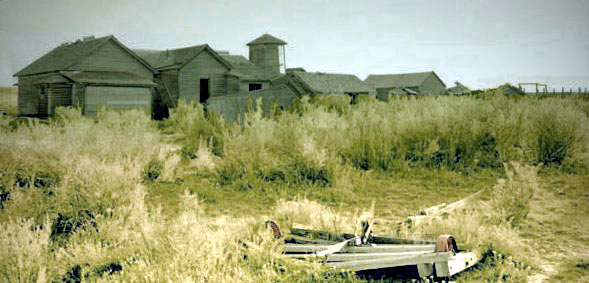
Rock Creek Station
The stage station at Rock Creek was constructed in 1860, and was destroyed, as
noted in the discussion of the Deadwood Trail, by Indians.
The town, itself, was founded
in 1867. The railroad reached it in 1868, and the town became an important junction
for freighters and stages heading north. It was the principle point of shipment for
supplies for Fort Fetterman and Powder River Country.
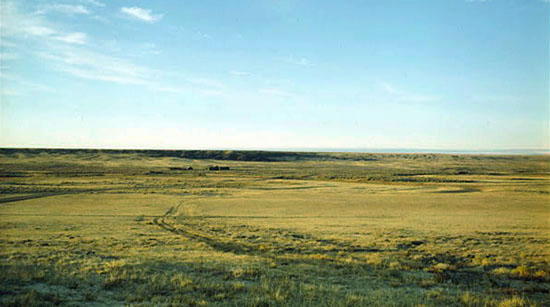
Distant view of remains of Rock Creek, 1975.
At the town's height, during cattle shipping season, a 100 car loads of cattle would be shipped out every day.
Some 175 teams of freighters customarily shipped out from Rock Creek northward. With all of the freighters in town, Rock Creek
could be rough. In 1882, a clerk in Charles Clay's store was hanged by some of the freighters. The
clerk had been rude to a customer, he shot the customer dead. The cowboys also could have
a little fun. "Benjamin F. "Big Ben" was six foot tall and weighed 200 lbs, big for the time when the average
cowboy was five ft. 8 inches tall and weighed 135 lbs. Ben had come up from Texas and in the 1880's was a top
hand from the Charles Herbertz Land and Cattle Company. Bill Nye described one occasion when Ben
had a little fun in Rock Creek:
Ben Carter had "heaps of fun," as he expresses it, at Rock Creek, west of Laramie, the other
day. Ben is a typical Western cowboy—a whole-souled, dare-devil puncher of steers; a fellow
who will divide his last dollar with a friend, or ride anything that has not more than four
legs and wears a saddle. Ben has one weak point, however, a fondness for the sulphuric acid
annihilator which Wyoming barkeepers retail as whiskey, and when he is "full" he is windy and
ready for any harmless mischief. On the day referred to Ben was at Rock Creek loading stock.
A dozen or more of his brother-cowboys were in town, and after the arduous duties incident to
crowding twenty more steers into a car than the builders intended were over, the boys began to "booze up,"
and by the time it got dark enough to light the lamps the saloon-keeper found that he hadn't any that were fit to do duty as illuminators—the boys had shot them to pieces. Every time a lamp would fall the marksman, who assisted at the post-mortem of said lamp, would cheerfully waltz to the bar and pay for it, and
then try again. The lamp market was active for a few minutes, but the supply was limited. Ben
hadn't taken a hand in the shooting-match as yet, but had made it a point to drink with the
successful marksmen, so that, strictly speaking, he wasn't sober. Finally, he awoke to action.
Seizing a revolver from a companion and drawing his own, he sprang to the centre of the room
and delivered himself of a speech. He told the boys that they ought to be ashamed of themselves. He was a perfect lady himself, and it shocked him to witness such disgraceful proceedings. He had been appointed as a Deputy Sheriff on his last visit to Laramie, and had decided to arrest every mother's son of them. The boys protested against such a strange procedure, but Ben flourished his guns, told them he had the whole United States at his back, and imperiously ordered them into an empty warehouse near, the door of which stood open. The novelty of the thing somewhat muddled the boys, and without a word they filed into the temporary prison, and Ben closed the door. He then rustled around and found several log chains, with which he securely fastened them, and, with the dignity of a high private in a State militia corps, mounted guard on the outside. The boys ventilated their prison cell as well as they could with what ammunition they had, and then dropped off to sleep. In the morning Ben released them, after exacting a solemn promise to behave themselves like gentlemen and ladies thereafter. The boys
walked over to the hotel as meek as lambs. While eating their breakfast they noticed that an
unusual amount of hilarity seemed to prevail in the dining-room. The head and only waiter
laughed boisterously while serving the soup; the cook poked his head through the doorway
leading to the kitchen, and drew it back again quickly, and a series of Comanche war-whoops
that were positively painful to their listening ears, gradually subsiding into a low, mellow
laugh which made the plates on the tables jingle, followed. Sounds of mirth also floated in
from the office, until finally one of the boys went out to inquire the cause. He came back
presently, and the most ignorant judge of the emotions as shown by the human features could
have told that he was unutterably mad. He consulted a moment with his companions, and then
called the waiter and ordered a box of "forty- fours." These were served cold, and the command
loaded their weapons and marched down to the saloon, where they found Ben Carter. The spokesman,
Broncho Bill, then and there told Ben that he was no gentleman. He had taken advantage of his
friends, and made them the laughing stock of the community. He had pretended that he was the
authorized Deputy Sheriff, when he had no more claim to the title of Deputy Sheriff than Ben Butler
had to the spoons history says he hypothecated. Believing that he represented the majesty
of the law, they had given him the respect he deserved. He had insulted them by putting them in
the "jug" over night, and they could only wipe out that insult by creating a vacancy in the
atmosphere thereabouts of about the size of his body. He must go, and go quick. Ben is brave
enough, but after he had looked over the crowd, and saw that each man had his hand on his
persuader, he concluded that perhaps Broncho Bill was right. He got: and when he had put several hundred yards of sagebrush and sand between himself and the station, the boys, having no further use of " forty-fours," emptied their revolvers. From the agile manner in which
Ben was dancing around as he passed swiftly over the brow of the hill toward Laramie, and the
amount of dust rising in little clouds all around him, it is believed the boys carelessly
pointed their weapons his way while taking the loads out."As quoted by Truman Ben C.: The
Field of Honor, Fords, Howard & Hulbert, New York, 1884.
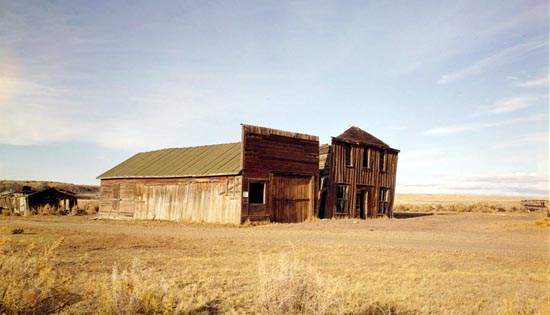
Remains of Stores, Rock Creek, 1975
As indicated by Nye, Ben had a weakness for booze. When well lubricated he was a beligerent drunk.
In 1888, on his way to round-up he stopped off at Jim Averell's Roadhouse.
There he became well lubricated.
When he got to the cowcamp, he began picking on a young 17-year old, mild-mannered cowboy, James Jefferies. At first,
Ben began taking pot shots through the roof of the tent and then, for no particular reason shot Jefferies
though the head. The jury said it was pre-meditated first degree murder. The night before he was hanged,
he was baptised and took communion. He spent the night reading the prayer book and singing a few lines from
Nearer My God to Thee.
Although the 1880 census for Rock Creek reflects a total population of 91, including one
individual, Noel Comfield, age 17 whose occupation was shown as "tramp," the town at its
height supported 5 saloons, but no churches. The stage trip to Custer City took
three days. At one time, in addition to the saloons, the town had 2 hotels,
the railroad depot, post office, the stage station, stockyards, and a school.
There were also two merchantile establishments, the one operated by Charles Clay and another owned by
William Taylor. Taylor also sold for cosmetic purposes a clay which was originally called "taylorite" but
later renamed by Wilbur C. Knight "bentonite" after the location where it was first found. The clay was
renamed by Knight because another substance in England bore the same name. Wilbur C. Knight was
professor of geology at the University of Wyoming and the father of Dr. Samuel Knight after whom the hall
at the University is named.
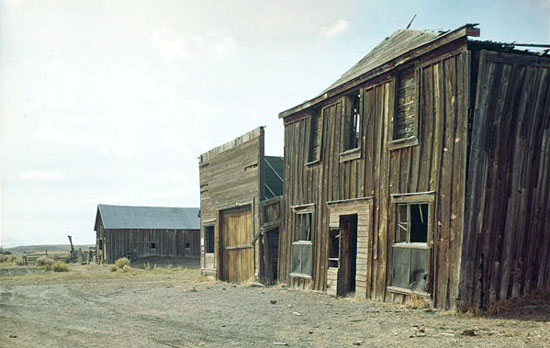
Remains of two stores and stable, Rock Creek, 1975.
The remains of Rock Creek are privately owned. Before visiting any ghost town, obtain permission from
the owner.
John Thayer's hotel received mixed reviewed in contemporaneous guidebooks. The 1881
Pacific Tourist described the dining room:
The dining-room is beautifully decorated with flowers, vines and horns of game, a pretty Bay
window with blooming flowers and walls covered with vines, and the display of hanging baskets, making the meal
one of the most agreeable on the rood.
In contrast, the 1880 Crofult's New Overland Tourist condemned the hotel with
faint praise The guide noted that the trains paused only 30 minutes for meal service "which is ample time, as the meals served are
not the best on the road; however, the fossiles [sic] are k-urious [sic]." Nevertheless, the dining room
must have done a good business. The hotel employed 5 waiters and 3 cooks.
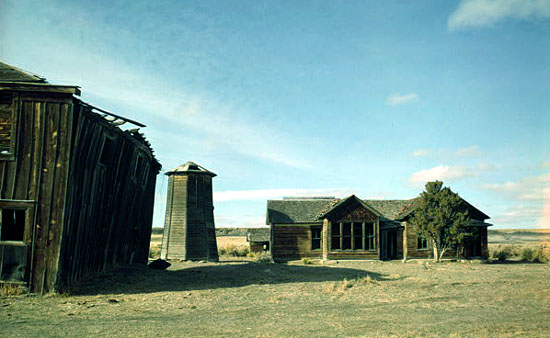
Remains of House, Rock Creek, 1975
The octagonal structure to the left of the house, is a water tank which served a central water system for the
town.
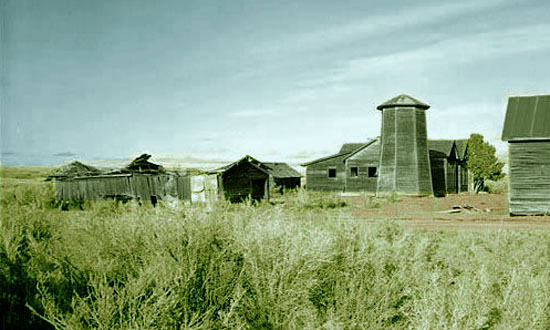
Remains of House, Rock Creek, 1975
With the coming of railroads to
Montana and interior Wyoming, stage and freight business northward was discontinued. The last stage was driven out of town
by C. D. Griffin. By 1899, the town was essentially abandoned, and the Union Pacific purchased the town at a
judicial sale.
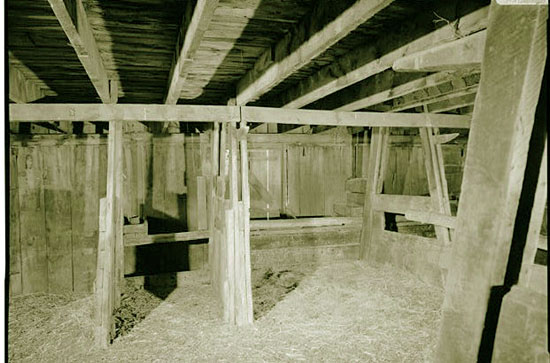
Interior of stable, Rock Creek, 1975.
In 1902, the Railroad sold the town to William Taylor. In 1909, Jesse W. White and Reuben Stockwell
discovered $4,177.50 buried in the cellar of the store previously operated by Taylor.
The discovery of the treasure trove, mostly in gold coin, has given rise to various myths as to the money's source. Rumors have abounded that
it may have come from a stage robbery or, considering that the Wilcox train robbery was only a short
distance away, that the source of the money was from outlaws such as the Wild Bunch.
The money was found buried in a glass jar in the cellar floor. White and Stockwell had
been employed by Taylor to shore up
a collapsing cellar wall in the former store building. In a subsequent lawsuit over entitlement to the treasure trove,
Taylor claimed that he had buried the money in the 1890's when he was operating the store because the closest bank was
some 47 miles away. The jury did not believe Taylor. The Supreme Court did, and Taylor received the
funds. A question never answered was that if Taylor had buried the money in the cellar, why did he leave it
there when the town was abandoned and sold to the Railroad? Taylor vacated Rock Creek's town plat in 1904.
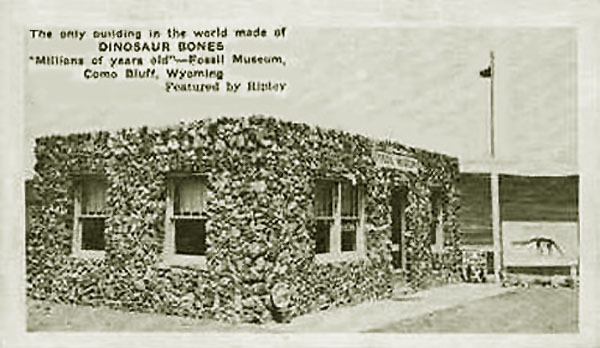
Como Bluff dinosaur Museum, undated
The Dinosaur Museum is located 7 miles east of Medicine Bow and was constructed in 1933 by Thomas Boylan (1863-1947) of
some 5,796 dinosaur fossils. which Boylan had collected over the preceeding 17 years. In 1953, it was featured in Ripley's Believe It of Not! as the
world's oldest building.
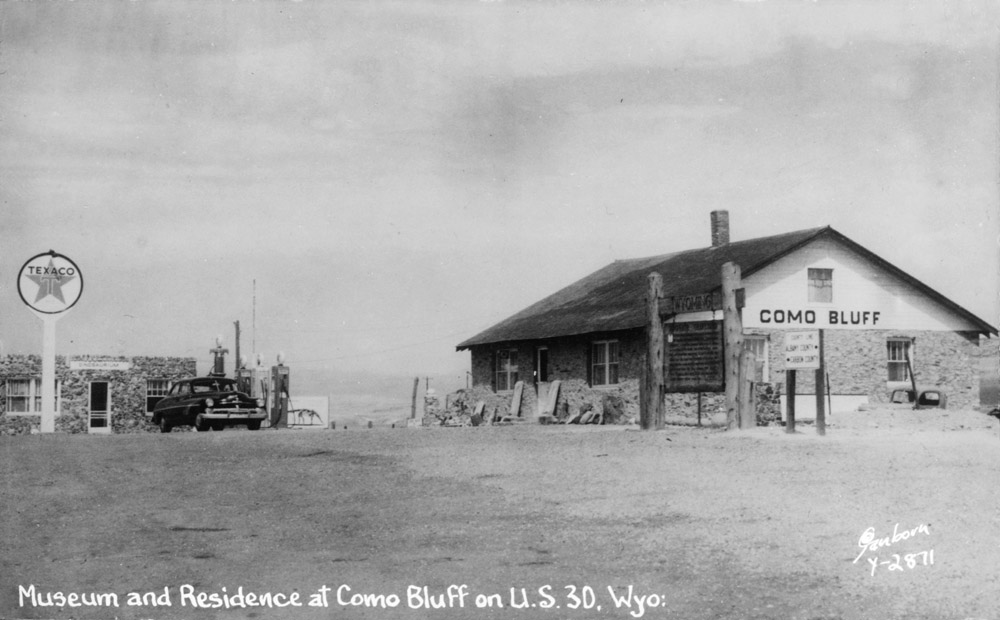
Como Bluff dinosaur Museum approx. 1949
Bolan's widow, Grace, (1894-1981) sold the museum in 1974. The cabin was placed on the National Register in 1908. In recent years the museum has been closed. Nearby are the Como Bluff dinosuar pits (discussed and pictured
with regard to the Bone Wars) and the "Bone Cabin Quarry," named
after an early trapper's cabin which had been also constructed of dinosaur bones.
Music this page: Lonesome Highway by Ted Daffin's Texans for Columbia.
Next: Medicine Bow.
|